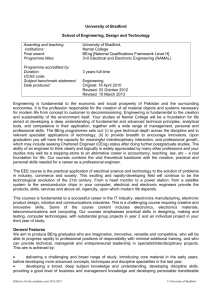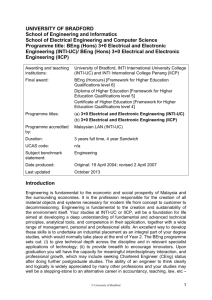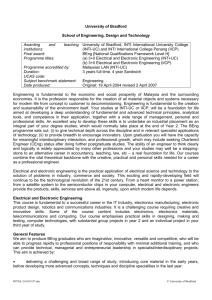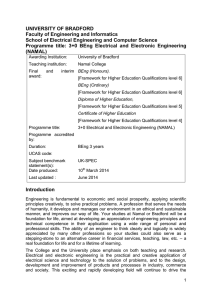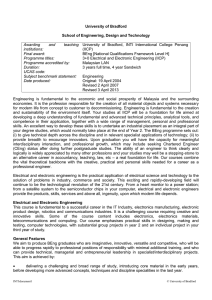(Hons) Electrical and Electronic Engineering (Namal)
advertisement
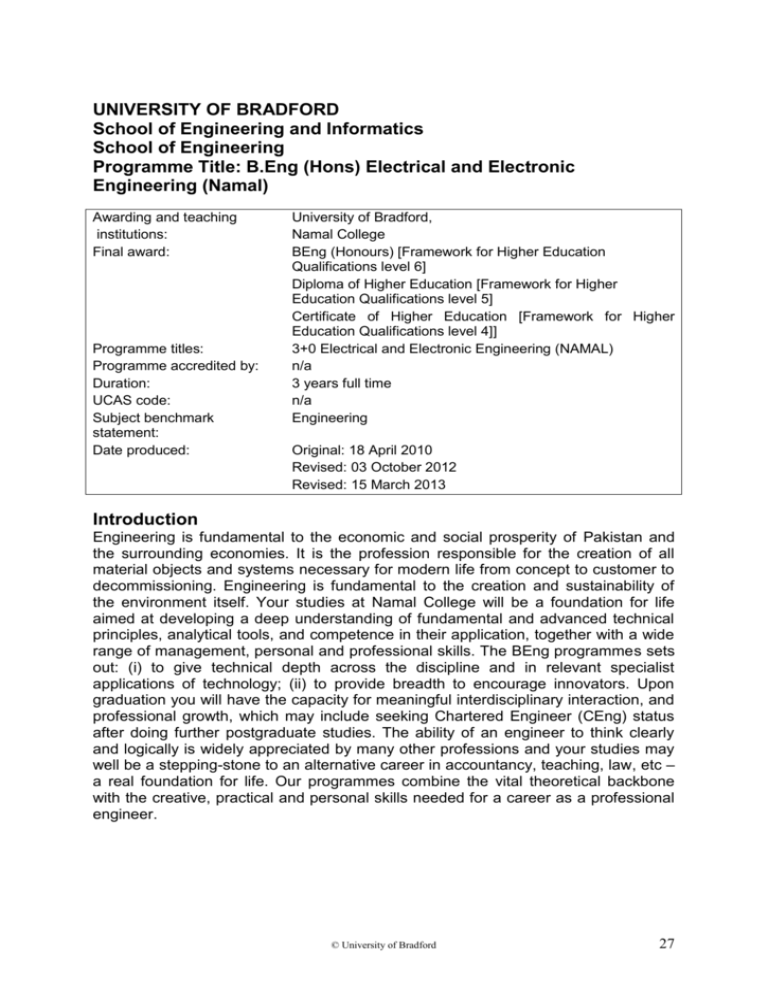
UNIVERSITY OF BRADFORD School of Engineering and Informatics School of Engineering Programme Title: B.Eng (Hons) Electrical and Electronic Engineering (Namal) Awarding and teaching institutions: Final award: Programme titles: Programme accredited by: Duration: UCAS code: Subject benchmark statement: Date produced: University of Bradford, Namal College BEng (Honours) [Framework for Higher Education Qualifications level 6] Diploma of Higher Education [Framework for Higher Education Qualifications level 5] Certificate of Higher Education [Framework for Higher Education Qualifications level 4]] 3+0 Electrical and Electronic Engineering (NAMAL) n/a 3 years full time n/a Engineering Original: 18 April 2010 Revised: 03 October 2012 Revised: 15 March 2013 Introduction Engineering is fundamental to the economic and social prosperity of Pakistan and the surrounding economies. It is the profession responsible for the creation of all material objects and systems necessary for modern life from concept to customer to decommissioning. Engineering is fundamental to the creation and sustainability of the environment itself. Your studies at Namal College will be a foundation for life aimed at developing a deep understanding of fundamental and advanced technical principles, analytical tools, and competence in their application, together with a wide range of management, personal and professional skills. The BEng programmes sets out: (i) to give technical depth across the discipline and in relevant specialist applications of technology; (ii) to provide breadth to encourage innovators. Upon graduation you will have the capacity for meaningful interdisciplinary interaction, and professional growth, which may include seeking Chartered Engineer (CEng) status after doing further postgraduate studies. The ability of an engineer to think clearly and logically is widely appreciated by many other professions and your studies may well be a stepping-stone to an alternative career in accountancy, teaching, law, etc – a real foundation for life. Our programmes combine the vital theoretical backbone with the creative, practical and personal skills needed for a career as a professional engineer. © University of Bradford 27 The EEE programme is the practical application of electrical science and technology to the solution of problems in industry, commerce and society. This exciting and rapidly-developing field will continue to be the technological revolution of the 21st century. From a heart monitor to a power station; from a satellite system to the semiconductor chips in your computer, electrical and electronic engineers provide the products, skills, services and above all, ingenuity, upon which modern life depends. This programme is fundamental to a successful career in the IT Industry, electronics manufacturing, electronic product design, robotics and communications industries. This is a challenging programme requiring creative and innovative skills. Some of the programme content includes electronics, electronics materials, telecommunications and computing. Our programmes emphasises practical skills in designing, making and testing, computer technologies, with substantial group projects in year 2 and an individual project in your third year of study. Programme Aims We aim to produce BEng graduates who are imaginative, innovative, versatile and competitive, who will be able to progress rapidly to professional positions of responsibility with minimal additional training, and who can provide technical, managerial and entrepreneurial leadership in specialist/interdisciplinary projects. This aim is achieved by: delivering a challenging and broad range of study, introducing core material in the early years, before developing more advanced concepts, techniques and discipline specialities in the last year. developing a broad, deep subject knowledge and understanding, developing discipline skills, providing a good level of business and management knowledge and developing personable transferable skills, all of which enable graduates to pursue programmes of further study, or to move quickly into leadership roles of responsible employment; providing a supportive, structured environment in which students are encouraged to develop independent learning skills; promoting educational opportunities for ethnic minority, women, mature and alternatively qualified students, as well as for school-leavers and traditionally qualified students. At the end of this programme, students will be able to understand and apply the principles of electrical and electronic for components and systems design, with a specialisation in power/ high current electronics. Students will also be able to undertake a project from start to finish, including planning, specification, PCB design, parts procurement, testing and commissioning, and also to professionally document and present the associated material. These skills will be of immediate value to an employer in the electronics field, and thus will be rewarded accordingly. Gaining a lower second or above on this programme could facilitate your route to becoming a Chartered Engineer, after completing an IET accredited Masters level programme of further learning. © University of Bradford 28 Programme Learning Outcomes Engineering is an interactive process usually involving creation, planning, analysis, design, economic evaluation, manufacture, operation and maintenance and decommissioning with a view to minimising environmental impact. In order to achieve the learning outcomes of the BEng award you will develop the following: Knowledge and Understanding of fundamental concepts, principles and underpinning theories; appropriate numerical methods to solve technical problems; fundamental and principles and practice of engineering design and manufacture; business and management practices for engineering; roles and responsibilities of professional engineers; concepts, principles and theories required for successful and creative innovation. Discipline Specific Skills in the use of computers in creation, innovation, design, and rapid prototyping; generic and specialised numerical methods for modelling and analysing engineering problems relevant to your chosen specialism; selection and application of principles of data collection and manipulation methods to support problem solving. Personal and Transferable Skills in data management and presentation; interpretation of information; IT and communication skills; creative and systematic problem solving; scientific method; lifelong learning; teamwork and leadership; and personal management. Curriculum At Namal, each Stage of a BEng programme comprises two terms of 15-weeks duration with 60 credits being studied in each term. For 10 credit modules all of the teaching and assessment is undertaken in the same term; some of the 20 credit modules have teaching and assessment that occurs in each of the terms. The BEng (Honours) programme structure that you will follow at Namal will take the same form as that delivered at the University of Bradford, UK, although with no optional subjects at present. This is shown in the following table. At the end of Stage 1 there may be the possibility to transfer onto the Ordinary route, to be discussed with the programme leader. An Ordinary route comprises of 100 credits at each Stage. Module Code Stage 1/Level 4 ENG1073L ENG1065L ENG1056M ENG1067L ENG1033M ENG1037M ENG1010M ENG1008M ENG1030M Credit Level 20 20 10 20 10 10 10 10 10 4 4 4 4 4 4 4 4 4 Module Title Engineering Analysis (Electrical) Robotics Engineering Computation Fundamentals of Telecommunications Introductory Mechatronics Digital Electronics Fundamentals Circuits and Systems Professional Skills Electronics Applications Project © University of Bradford BEng Hons C C C C C C C C C 29 Stage 2/Level 5 ENG2020M ENG2088M CY-0205M ENG2018M ENG2052M ENG2043M ENG2021M ENG2013M ENG2016M ENG2045M ENG2037D 10 10 10 10 10 10 10 10 10 10 20 5 5 5 5 5 5 5 5 5 5 5 Mobile Communications Systems Further Engineering Analysis (Electrical) Sensors and Actuators Digital Electronics Design Technology Operations Management Power Electronics and Machines Transmission Principles Financial Management Introductory Control Analogue Electronics Group Design Project Stage 3/Level 6 ENG4007M 10 ENG3042J 30 ENG3048M 10 7 6 6 ENG3019M ENG3026M 10 10 6 6 ENG3009M ENG3051M ENG3011M 10 10 10 6 6 6 ENG3067M ENG3022M 10 10 6 6 Digital Signal Processing Project Quality Assurance and Management - Six Sigma for Business Excellence Advanced Control Advanced Mobile and Satellite Communications Project Management Digital Design Using HDL Corporate Strategy and Engineering Management Signals and Systems Theory Power Devices and Applications Key C = Core Hons C C C C C C C C C C C Ord O O O O O O O O O O C Hons C C C Ord O C O C C O O C C C C O O C C O O O = Option The curriculum may change, subject to the University's programme approval, monitoring and review procedures. Assessment Regulations Whilst this Programme conforms to the general principles set out in the standard University Assessment Regulations which are available at the following: http://www.bradford.ac.uk/aqpo/ordinances-and-regulations/ Teaching and Assessment Strategies You will experience a wide range of teaching and learning environments. Concepts, principles and theories are generally explored in formal lectures, practised in associated tutorials and demonstrated in laboratory classes. Practical skills are developed in laboratory, drawing office, design studio or fieldwork sessions. Cognitive and personal skills are developed in more open-ended problem solving and design exercises, often tackled by working in small groups supported by members of academic staff. Project work is used to bring together various aspects of your programme, including interdisciplinary issues. © University of Bradford 30 Typically, each module at Stage 1 and 2 will involve you in 36 hours of organised teaching. However, this is reduced to 24 hours at Stage 3 as you are encouraged to become more self-supporting and independent in your approach to learning by way of individual, interdisciplinary, and research-based projects. Methods of Assessment are varied and your progress will be assessed using a mix of formal examinations, various technical reports, essays, oral presentations and dissertations, and will followed identically at Namal. Student support and guidance This is provided at Namal and the University. All members of academic and support staff at Namal and the University are accessible. All you need to do is ask and we are willing to help. Your time studying for your degree will result in personal and professional associations that will sustain you throughout your career. Namal college provides important facilities including extended access to Library and Computing services. The Career and Counselling Centre provides free counselling and related services, such as the Mentor Mentee Programme, study skills and career seminars. The Student Affairs Office provides welfare services and support to the disabled. Further Information: For further information, please check the University prospectus or contact Admissions. Namal College, 33KM Talagang Road Mianwali Pakistan http://www.namalcollege.edu.pk/ Tel: 0092 42 5805034 School of Engineering and Informatics University of Bradford Richmond Road Bradford BD7 1DP ug-eng-enquiries@bradford.ac.uk Tel: +44 (0)1274 23 4567 The contents of this Programme Specification may change, subject to the University's programme and regulatory approval, monitoring and review procedures. © University of Bradford 31

